Dear wanderer of the fantasy wilderland, in this blog you will find aid in your everlasting journey of finding more fantasy books. Week by week (hopefully) there will be posts introducing new authors and titles. In here you will find from classic high fantasies, YA fiction to mythology corpus. Check out the ever growing Index, pick the title of your fancy and imerese yourself in new worlds. Have a nice read!
Don't wanna be here? Send us removal request.
Quote
“You will find the way, daughter of the forest. Through grief and pain, through many trials, through betrayal and loss, your feet will walk a straight path.”
Juliet Marillier, Daughter of the Forest (via rabbitinthemoon)
2K notes
·
View notes
Quote
One thing I realised at the outset was that this was a branch of writing entirely dominated by adults. It must be the only branch in which a writer cannot address his/her audience directly.In order to say something to readers of fifteen and under, I (who am an adult) must first speak to an agent (who is an adult) then a publisher (who is another adult), a reviewer (who is an adult whose brain hurts), a bookseller (again an adult), and if I can make it through this barrage, then the book is usually bought by teachers, parents and librarians, all of whom are adults too. All these people have preconceptions about what should be in this book - preconceptions brought about by their own early reading an their upbringing - and they are going to, quite inevitably, exercise an unprecedented degree of censorship over this book.Now there is a strong plus-side to this: this phalanx of adults is going to insist on high quality. They are not going to let me, or any writer, get away with shoddy, unclear language, or a story that does not make sense, nor the whimsical changes of size that so worried me about Toad. Rather more importantly on the plus side, is hat what I write, just because it has to speak to adults too, is going to be written on two levels at least - maybe more. This is something I shall come back to. For the moment, I want to look at the minus side. The minus side is that many adults are going to make all sorts of insanely wrong assumptions about what should go into a good book for young readers. When I first started writing, man of these assumptions were elevated into rules - nay laws! - which you broke at your peril. I broke most of them very deliberately, because they were truly absurd. For instance, all adults in your story had to be godlike and above reproach. This applied particularly to parents […] The only adults allowed to have faults were baddies, and they had to be killed at the end of the book even if all they had done was purloin the family silver. Now the absurdity here is that, just as children’s books are adult-dominated, so are children themselves. On my rough reckoning, most children spend two-thirds of their waking hours dealing with parents at home and teachers at school - and only spend the remaining third of their time in that ideal world of the old-type children’s book, entirely composed of other children. And as everyone knows, adults are by no means flawless - especially if they happen to be divorcing - and children have to deal with a lot of that. So I put adults in my books who behaved like real people do (and didn’t get killed for it). This worried publishers. Even worse I also allowed these adults in the story to perceive that strange thins were happening to the children and - worse! - to become involved in the strange things too. You wouldn’t believe how many publishers turned down The Ogre Downstairs for that reason. I admit this is an extreme case, since the Ogre does nearly get murdered, twice, by magical means. But what really bothered the publishers was not that. It was that the Ogre got involved. Adults were supposed to be sacrosanct. This ties in with the next unwritten law from those days. I had a number of books turned down at that time because I didn’t say what ages the children in them were. This was another deliberate flouting of rules. You were supposed to say. My most obvious reason for not saying was that you feel a fool, if you are a mature twelve, if you discovered you have been eagerly identifying with a character who turns out to be five years old. But there is a more important, hidden reason which comes out if you consider the situation in C.S. Lewis’s Narnia books. Lewis doesn’t say what ages his children are either, but there comes a point where Peter and Susan, the two elder ones, are unable to enter Narnia because they are too old. Susan is specifically stated to have begun - horrors! - wearing makeup and thinking of boys. But, oddly enough, four adults are able to enter Narnia. These are two outright villains and two industrious working people. Nobody else gets to Narnia unless they are dead. Now, I know Lewis was certainly thinking in religious terms - no one shall enter the kingdom of heaven unless they become as a little child - but the land of Narnia, is, in spite of being an allegory of heaven, to most readers pre-eminently the vivid land of imagination. So what Lewis has ended up implying is that only young children, criminals and the uneducated working class can be allowed to exercise their imaginations. I think this has come about because, as well as thinking of Narnia as ehaven, Lewis supposed himself to be keeping the rule that adults are not to be involved in children’s books. But because he was gifted with penetrating intuition, he has in fact uncovered the basis for both the first rule and the second: which is that no one past puberty should have anything to do with fantasy. In other words, after the age of fourteen at the most, you have to close down one very large area of your brain.
Diana Wynne Jones, Negatives and Positives in Children’s Literature (via fyeahdianawynnejones)
104 notes
·
View notes
Link
3 notes
·
View notes
Photo


My version of “Howl’s moving castle” book by Diana Wynne Jones. It was never published like that,it’s just a model,for my university project
453 notes
·
View notes
Quote
Sophie was almost awed. “You mean you jilted the Witch of the Waste?” Howl cut himself another lump of cake, looking sad and honorable. “That is not the way to put it. I admit I thought I was fond of her for a time. She is in some ways a very sad lady, very unloved. Every man in Ingary is scared stiff of her. You ought to know how that feels, Sophie dear.” Sophie’s mouth opened in utter indignation. Michael said quickly, “Do you think we should move the castle? That’s why you invented it, wasn’t it?”
Howl’s Moving Castle by Diana Wynne Jones

(via sky665)
766 notes
·
View notes
Text
I sometimes wonder what effect The Tough Guide to Fantasyland had on the genre. It was published in 1996, and I’ve read very little fantasy from before that (except like… Lord of the Rings), but the more recent stuff I have read uses relatively few of The Tough Guide’s tropes unlampshaded (except, perhaps, the omnipresence of campsite stew). George R. R. Martin said in 2006 that he consciously used it for reference to avoid cliches in his own work, and I wonder how many other authors did so as well. If so, it was probably part of a larger feeling that the genre needed refreshing, but I do wonder to what extent this one book was responsible for pushing things.
73 notes
·
View notes
Text

Month of the Celts
Power of Three
by Diana Wynne Jones
Ayna could predict the future. Cari could find what was lost. Gair thought he was ordinary. The three children of Gest, the chief of Garholt, know the perils of the Moor on which they live. The Dorig, their people’s enemies, are cold-blooded, fierce underwater creatures who terrify anyone unlucky enough to happen upon them. The Giants are dangerous and violent. But it’s not until their home is invaded that Gair learns of a dying curse that endangers all three peoples of the Moor. A curse that ordinary Gair, with the help of his extraordinary brother and sister, may be able to break, but only at the most dreadful risk to all three, and to the Moor itself.
Summary taken from good reads.
See more info on good reads and the library thing.
2 notes
·
View notes
Photo



Month of the Celts
Power of Three
by Diana Wynne Jones
1 note
·
View note
Link
Want to read Diana Wynne Jones? Tor.com has some excellent advice on where to start.
185 notes
·
View notes
Text
In the fantasy world, Tolkien is a historian, Rowling is a naturalist, and Diana Wynne Jones is a physicist. I’m not sure if the analogies work.
46 notes
·
View notes
Conversation
Howl's Moving Castle {Sentence Starters}
"I'd appreciate it if you wouldn't torment my friend."
"They say that the best blaze burns brightest, when circumstances are at their worst."
"I feel terrible, like there's a weight on my chest."
"Your hair looks just like starlight. It's beautiful."
"I have this weird feeling you're going to leave. Tell me what's going on! Please."
"I specifically ordered you not to get carried away!"
"A heart's a heavy burden."
"Yeah, but no-one really believes that. Come on, let's be honest."
"I just organized things. Nothing's ruined."
"Lets run! Don't fight them, ____!"
"There you are sweetheart, sorry I'm late."
"You sabotaged me! Look! Look at what you've done to my hair!"
"I saw him do this once before when a girl dumped him!"
"Sorry, I've had enough of running away. Now I've got something I want to protect. It's you."
"I give up. I see no point in living if I can't be beautiful."
"Here's another curse for you - may all your bacon burn."
"Well, the nice thing about being old is you've got nothing much to lose."
"It looks like your true love is in love with someone else!"
"Whatever you don't want me to clean, better hide it now!"
"I know I can be of help to you, even though I'm not pretty and all I'm good at is cleaning."
"Why'd you make me come here if you were coming yourself?"
"Knowing you'd be there gave me the courage to show up."
"Don't be alarmed, but I'm being followed. Act normal."
"It's so strange. I've never felt so peaceful before."
"So that did happen. It wasn't a dream."
"Sorry, it looks like you're involved."
1K notes
·
View notes
Photo

House of Many Ways - Diana Wynne-Jones
A favourite book cover of mine, by John Rocco.
785 notes
·
View notes
Photo
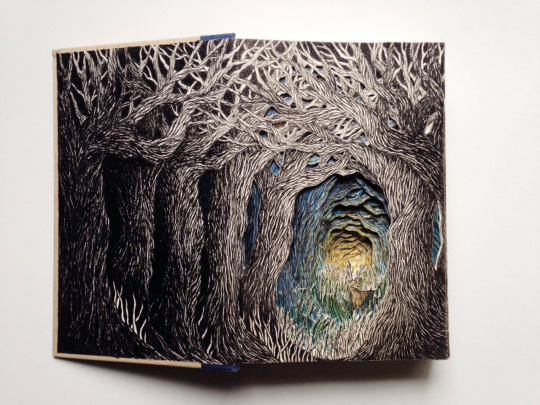

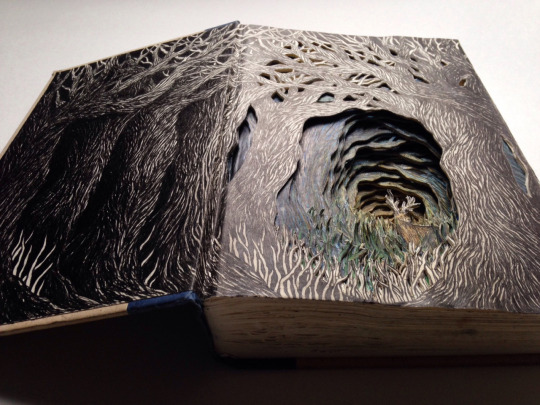
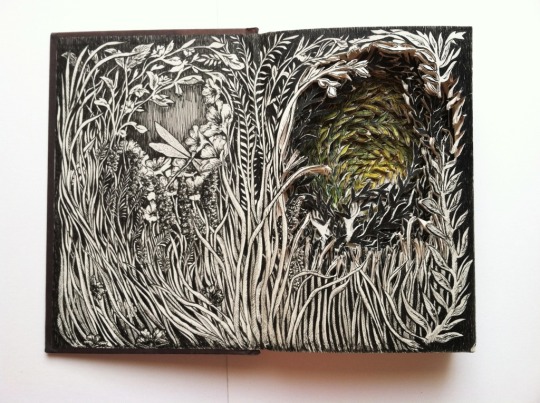
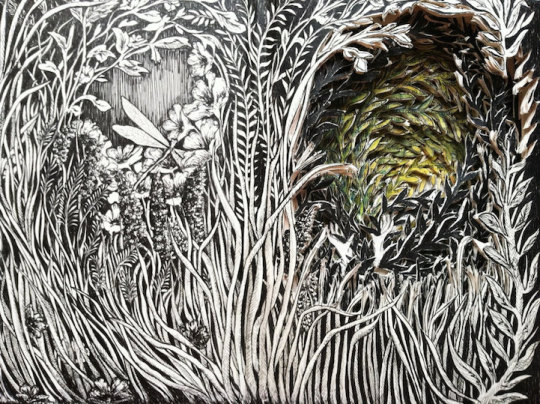

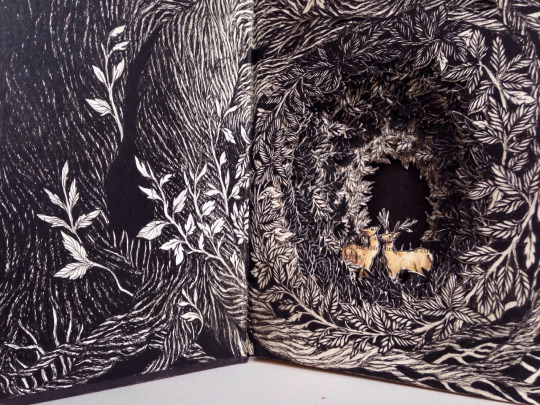



Stunning 3D Illustrations Are Carved Into Obsolete Books by Isobelle Ouzman
Illustrator Isobelle Ouzman creates stunning book sculptures with the use of an X-Acto knife, micro pens, and watercolor paints to transform discarded books into intricate sculptures. By recycling these books for the use of art, Ouzman practices an immense demonstration of patience and love. Her three-dimensional drawings feature woodland creatures, dainty fairies and secret hiding spaces in obscure forests. She confesses: “I value books greatly. With technology the way it is, not many people are as willing to read physical books, so they sit untouched and are discarded.” You can find more of her creations on her Etsy shop, which is open to commission.
View similar posts here!
19K notes
·
View notes
Quote
Diana would talk about her ‘travel jinx,’ and I thought she was exaggerating until we had to fly to America on the same plane. The plane we were meant to fly on was taken out of commission after the door fell off, and it took many hours to get another plane. Diana accepted this as a normal part of the usual business of travel. Doors fell off planes. Sunken islands rose up beneath you if you were in boats. Cars simply and inexplicably ceased to function. Trains with Diana on them went to places they had never been before and technically could not have gone.
Neil Gaiman, “Foreword: Diana Wynne Jones, Reflections on the Magic of Writing” (via vault-of-quotes)
1K notes
·
View notes


